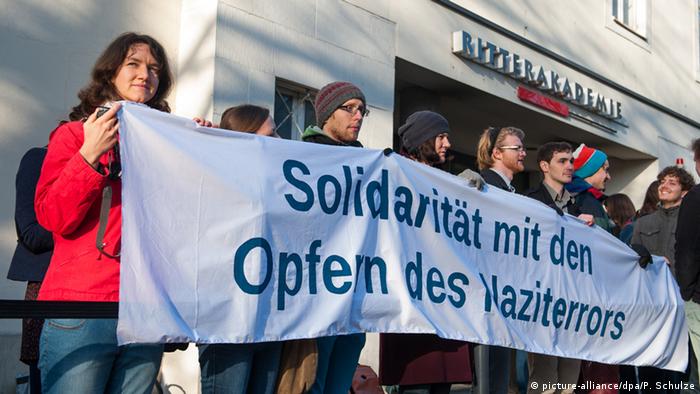The trial has begun for a former worker at the World War II Nazi prison camp known as the “bookkeeper.” He faces 15 years in prison if convicted of being an accessory to murder in 300,000 cases.

Oskar Gröning’s trial began on Tuesday in the German city of Lüneburg near Hamburg. The 93-year-old man is facing the charge of being an accessory to murder at the Auschwitz death camp in World War II.
The case is unique because Gröning is not accused of actually committing any murders. His charges center on his role in the mass murder that occurred at Auschwitz. The prosecution’s case focuses on 300,000 Hungarian Jews killed at the camp between May and July 1944.
In total, 1.1 million people were killed in Auschwitz over the course of the war.
Trial attracts supporters and deniers
DW’s Ben Knight spoke to a mixed crowd of Holocaust survivor supporters and Holocaust deniers outside the courtroom in Lüneburg on Tuesday. One person said Gröning was a “victim of the time and a victim of the German justice system.” Another person said she had come to Lüneburg to “honor victims” of the Holocaust and was happy that a trial was taking place.
One group held a sign (pictured above) that read “solidarity with victims of Nazi terror.”
Eva Pusztai, who made it out of Auschwitz alive, is one of around 60 survivors and victims’ relatives acting as co-plaintiffs in the case. Ahead of the trial, she told reporters in Lüneburg “it was an important moment in my life to at a trial here where a former SS man […] will be convicted.”
She added, “it’s not about the punishment – it’s about the conviction.”
‘Just a cog’
Gröning has been open about the fact that he worked at Auschwitz during the war, and although admitting he was ashamed of his role, saying he was “a cog in the killing machine,” he maintains that he claims he never personally committed any atrocities.
The former member of the Nazi Waffen-SS worked at Auschwitz in occupied Poland at age 21. His nickname, the “bookkeeper,” came from the fact that he was responsible for counting the banknotes gathered from prisoners’ luggage and passing them on to the SS authorities in Berlin.
When he was charged in the northern German city of Hanover last year, prosecutors said Gröning also helped remove victims’ luggage to prevent it from being seen by new arrivals – thereby hiding the traces of the Nazi mass killing.
Precedent exists
Gröning is just one of 30 former Auschwitz personnel who were recommended to state prosecutors in 2013 by the German office investigating Nazi war crimes.
The renewed drive to bring justice to the last surviving perpetrators of the Holocaust came following a 2011 landmark court ruling.
For more than 60 years, Nazi war criminals had only been prosecuted if evidence proved that they had personally committed atrocities.
In 2011, however, a Munich court sentenced John Demjanjuk to five years imprisonment for collaborating in the extermination of Jews at the Sobibor camp, also in occupied Poland, where he served as a guard.
Due to the fact that there are very few former soldiers like Gröning still alive to face trial, his is likely to be one of the last of its kind.
(dpa, AFP, Reuters)































